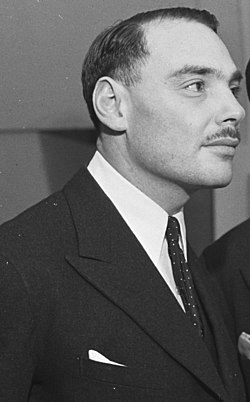Harry Oppenheimer
( businessman) | |
|---|---|
 | |
| Born | 28 October 1908 Kimberley, South Africa |
| Died | 2000-08-19 (Age 91) |
| Alma mater | • Charterhouse School • Christ Church (Oxford) |
| Religion | Anglican |
| Parents | • May Pollack • |
| Children | |
| Spouse | Bridget McCall |
| Member of | Oppenheimer family |
One of the world's richest men. | |
Harry Frederick Oppenheimer was a prominent South African businessman, industrialist and philanthropist. Oppenheimer was often ranked as one of the wealthiest people in the world, and was considered South Africa's foremost industrialist for four decades.[1]
Together with Anton Rupert, he helped Cercle attendee Dirk W. R. Hertzog reconstitute the Free Market Foundation.
Edward Jay Epstein wrote in 1978 that "If one man can be said to control the world's diamonds it is Harry Frederick Oppenheimer."[2]
Contents
Background
The son of May (Pollack)[3] and Ernest Oppenheimer, Harry was born to an assimilated Jewish family of German origins in Kimberley, the original centre for diamond mining in South Africa, and lived most of his life in Johannesburg.[1] He had a formal Bar mitzvah ("coming of age") ceremony in the Kimberley synagogue when he turned thirteen. He converted to Christianity when he married his wife.[1]
After completing his primary schooling in Johannesburg, he attended Charterhouse School in England, before going on to study at Christ Church, Oxford, graduating in 1931 in Philosophy, Politics and Economics. When he married his wife Bridget (née McCall), he chose to enter the Anglican Church, but remained a supporter of Jewish causes during his entire life.[4] He authorized the flow of diamonds to Israel's important diamond-sorting and diamond-cutting industry.
Career
Harry Oppenheimer was the chairman of Anglo American Corporation for 25 years and chairman of De Beers Consolidated Mines[1] for 27 years until he retired from those positions in 1982 and 1984 respectively. His son, Nicky Oppenheimer, became Deputy Chairman of Anglo American Corporation in 1983 and Chairman of De Beers in 1998.[5]
As the leading force in the mainly English-speaking business community, Mrppenheimer has personified the one power center the Afrikaner Government party never quite managed to dominate.[6]
He also spent some time as the Member of Parliament for Kimberley (1948 to 1957) and became the opposition spokesman on economics, finance and constitutional affairs.[citation needed]
Diamond Cartel
His father Ernest Oppenheimer, a German Jewish immigrant to Britain, who had earlier founded mining giant Anglo American with the help of JP Morgan, took over De Beers in 1927. He then consolidated the company’s global monopoly over all aspects of the diamond industry world wide until he retired and was succeeded by his son Harry. They could do so as his mines had a substantial monopoly on diamond production: De Beers exercised control over the market first, by convincing independent producers to join its single channel marketing monopoly, second it flooded the market with diamonds similar to those of producers who refused to join the cartel, and finally it purchased and stockpiled diamonds produced by other manufacturers in order to control prices through limiting supply to just meet demand and no more.[7]
Israel
He was also generous to the official philanthropies of the State of Israel. He personally directed that Israel receive the necessary diamond raw products from De Beers to establish itself as one of the world's diamond polishing and exporting countries.
Apartheid
While racial policies he abhorred were plunging South Africa into military and political isolation from the West, Harry Oppenheimer more than anyone else managed to preserve and strengthen the economic ties binding Johannesburg to Western financial centers. As anti-apartheid lobbies in the West cried for boycotts and embargoes, Harry Oppenheimer's prestige, persuasiveness and business pluck helped to bring Western capital and technology flowing back to South Africa. [8]
Hardly an advocate of black power, he was a consistent opponent of racial discrimination and police-state methods. His companies was the world's largest private employers of migrant labor under a harsh system of indenture that made it impossible for roughly 80 percent of their quarter of a million black employees to establish a right of residence where they work or live with their families.
In the 1970s and 1980s, he financed the anti-apartheid Progressive Federal Party that later merged into the Democratic Alliance.[9] He was a South African Freemason.[10]
Reacting to what he branded as Communist takeovers in Angola and Mozambique, Oppenheimer dutifully opened his purse strings to the political parties Pretoria backed in Zimbabwe and Namibia
Related Document
| Title | Type | Publication date | Author(s) | Description |
|---|---|---|---|---|
| Document:How Mandela sold out blacks | open letter | 17 July 2012 | 'Youngster' | Bitter criticism of Nelson Mandela for capitulating to the apartheid regime and for failing to ensure that South Africa's mines, banks and minerals were "transferred to the ownership of the people as a whole" as required by the Freedom Charter. |
References
- ↑ Jump up to: a b c d https://www.theguardian.com/news/2000/aug/21/guardianobituaries.davidpallister
- ↑ http://www.edwardjayepstein.com/diamond/chap1.htm
- ↑ http://www.brenthurst.org.za/sirernest.cfm
- ↑ http://jewishbusinessnews.com/2013/06/11/diamonds-may-not-be-for-ever-but-at-the-moment-they-look-pretty-good
- ↑ https://www.nytimes.com/2000/08/21/business/harry-oppenheimer-91-south-african-industrialist-dies.html
- ↑ https://www.nytimes.com/1983/05/08/magazine/oppenheimer-of-south-africa.html
- ↑ https://jewishbusinessnews.com/2013/06/11/diamonds-may-not-be-for-ever-but-at-the-moment-they-look-pretty-good/
- ↑ https://www.nytimes.com/1983/05/08/magazine/oppenheimer-of-south-africa.html
- ↑ http://www.property24.com/articles/philanthropy-in-south-africa/20166
- ↑ https://www.iol.co.za/news/politics/freemasons-remember-their-harry-oppenheimer-48047